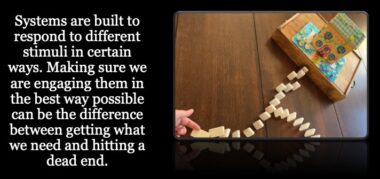6 simple tips to get the most from the complex systems we rely on
How to navigate healthcare organizations when our wellness is at stake
Written by |

I love systems. From a professional standpoint, they fascinate me. I spent 20 years working as a social worker within a large system where I “grew up” professionally. Even when that system was frustrating, I understood it.
I developed a new appreciation for the challenges of such systems as my world flipped when my daughter Amelia, now 11, was diagnosed with Friedreich’s ataxia (FA) at 8 years old.
Regardless of why, we’ll all find ourselves at some point knocking on the doors of systems to seek help. This pursuit can be exhausting when we’re already facing many other challenges, so let’s talk about some ideas for navigating this journey.
A different way to look at systems
I come from a mechanical family, so imagine my surprise when one of my most memorable failures in middle school came when I demonstrated a Rube Goldberg project.
This device had multiple components: a fulcrum, a lever, and a pulley system. They were supposed to move a golf ball from one end of the machine to another. I was confident that all systems were go. The ball moved, the lever flipped, and the pulley, well, it pulled.
When the moment of truth came before my entire class, however, my project didn’t work. OK, it wasn’t the project; it was me. My shaking hands and pounding heart had upset the delicate device. The harder I tried to make it work, the less effective the outcome.
This presentation was my first introduction to systems. Sometimes our best efforts to get them to do what we want can end in failure, frustration, and, for me, tears.

This gingerbread house, created by sisters Amelia and Katherine Hamilton, has dominoes leading up to it, some fallen: another system crash. (Photo and graphic by Elizabeth Hamilton)
Lessons from Rube Goldberg
I had to recalibrate my mindset to function effectively with the various systems in my life. Since I have limited time and energy, I need to safeguard both because FA doesn’t care if systems distract me. It doesn’t give me or my family days off. It has its own gravitational pull.
So here are a six steps to consider as you navigate the various systems that affect our lives, especially those of us living with FA or a similar disease.
Step One: Build emotional boundaries. Though the outcome of a system’s decision may have profound implications for your life, protect your heart. When you’re denied, you’ll have an emotional reaction, but try to prepare for the worst and hope for the best. A denial is not always a no; it can be a “not yet,” often with options to appeal or fight back. Save your strength.
Step Two: Understand the system. They all have policies and procedures to protect clients, staff, and the organization. They exist for a reason and can be a gateway to efficacy.
When navigating them, learn what you can to increase your chances of success. Do you have anyone within your network who’s worked with or for the organization and can help you? Can you get handbooks or copies of the policies that govern your needed services or care? What governing boards or outside organizations hold these systems accountable? When should those organizations be engaged? Can you get a checklist of what needs to be submitted or done? Sometimes that one missing form is critical.
Step Three: Put and get things in writing, but keep it professional. Be a partner when possible. When communicating with systems, use dates, times, observations, and facts. Remember that all this information can be pulled into a case record, a hearing, or a court proceeding, so be mindful. Avoid accusatory language that can cause defensive responses.
Systems are systems, but they’re run by people who all have the same range of emotions that you do. Some of them are overworked and overwhelmed.
Step Four: Follow up, and then follow up. Did I just say “follow up” twice? Yes, I did. The help you need may be someone’s job, but it’s your life. You’ll care more. Still, remembering to check back in can be depleting; I put reminders on my calendar so it takes less of my head space.
Step Five: Take care of yourself. This work is hard, even without the disease’s impact. As one of my friends used to tell me all the time, you cannot pour from an empty cup. Make sure you are filling that cup back up!

A reminder that helps Elizabeth. (Photo and graphic by Elizabeth Hamilton)
Step Six: Share your experiences with the community. We all learn from each other. You’ll feel good contributing to others’ well-being.
The past few weeks of working with the systems that support Amelia have been overwhelming. But writing this column? It made me feel better. Thanks for being part of my journey.
Note: Friedreich’s Ataxia News is strictly a news and information website about the disease. It does not provide medical advice, diagnosis, or treatment. This content is not intended to be a substitute for professional medical advice, diagnosis, or treatment. Always seek the advice of your physician or another qualified health provider with any questions you may have regarding a medical condition. Never disregard professional medical advice or delay in seeking it because of something you have read on this website. The opinions expressed in this column are not those of Friedreich’s Ataxia News or its parent company, Bionews, and are intended to spark discussion about issues pertaining to Friedreich’s ataxia.




Leave a comment
Fill in the required fields to post. Your email address will not be published.